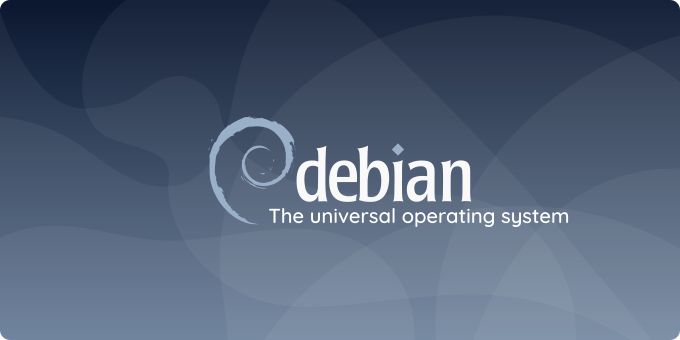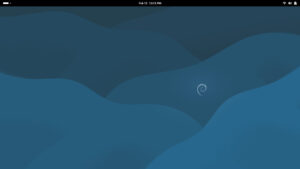In the age of computers, 30 is a ripe old age. Happy birthday, Debian.

The Linux distribution Debian turned 30 today.
Just as Linux got started with a short message from its creator that a “little” operating system which probably won’t amount to much was being built, Debian was announced to the world by a similar message from its founder, the late Ian Murdock, that was posted to the comp.os.linux.development Usenet newsgroup:
“This is just to announce the imminent completion of a brand-new Linux release, which I’m calling the Debian Linux Release. This is a release that I have put together basically from scratch; in other words, I didn’t simply make some changes to SLS and call it a new release. I was inspired to put together this release after running SLS and generally being dissatisfied with much of it, and after much altering of SLS I decided that it would be easier to start from scratch. The base system is now virtually complete (though I’m still looking around to make sure that I grabbed the most recent sources for everything), and I’d like to get some feedback before I add the ‘fancy’ stuff.”
My immediate takeaway from reading about Debian’s birthday on LWN was to think, “Holy crap, Batman! Thirty years ain’t nearly so long as it used to be.”
Humor this old gal for a second, if you don’t mind, so I can explain to you how my life and Debian do and don’t intertwine.
Back when The Beatles released “Sgt. Pepper’s Lonely Hearts Club Band,” which was precisely 20 years after Sgt. Pepper taught the band to play (which I know because the album starts off saying so), 20 years was a long fucking time. Sgt. Pepper was released on May 26, 1967, and twenty years before that, when the band was being taught to play, I was minus four-years-old, again pretty precisely since my 16th birthday came the day after the album’s release.
I can remember this distinctly because (for those of you who are too young to know or care), on the first side of the album is a McCartney composition, “She’s Leaving Home,” about a young gonnabe hippie chick sneaking out of the house at the break of day to run away from home.
As it so happened, when I left home on the morning after Sgt. Pepper was released, instead of going to school I went to my home city’s downtown area and jumped through a few hoops at the bank in order to withdraw, without a passbook and without having my parents notified, the $110 or so that I had a savings account. I then spent $4.00 or so for a one-way Greyhound bus ticket to Raleigh, where I found a job as a dishwasher that same day at a Shoney’s, and never returned home to live after that.
In other words, a day after “She’s Leaving Home” was released, I ran away from home, with the main difference between me and the song being that I didn’t get to meet with a man from the motor trade, which was probably just as well.
A few days later, “She’s Leaving Home” would become the first song I heard from the Sgt. Pepper’s album when WYNA (“your winna at 1510”) played it on the radio.
Anyway, all of this is to explain why my first takeaway upon hearing that Debian had just turned 30 was to think that 20 years before Sgt. Pepper came out would have been a negative number age-wise for me, but that 30 years ago from today, which is when Debian was born, I was already an old person at 42 (remember, don’t trust anyone over 30).
Ten Years After
I didn’t know anything about Linux or Debian or free software or any of that stuff 30 years ago. I didn’t know anything about Debian 25 years ago either, which was when Deb would’ve turned five. I wouldn’t actually know much about Linux, or anything at all about Debian, until somewhere between the turn of the century, which is when I started reading about Linux and open-source, and 2002, which is when I did my first Linux installation. That would have been about 20 years ago, when I was somewhere between 49-51 years old, or just shy of being able to take advantage of the senior discount at Bojangles.
Back then, Linux was something that was mainly used by geeks on their desktops. My first install was Mandrake, because everyone said it was easy to use, and even though I was trying to pass myself off as a tech sistah (as in, the distaff side of “tech bro”), I really basically just knew enough MS-DOS to get by (using a computer for me was like an open book test, with “MS-DOS For Dummies” always at the ready), and some tricks that were supposed to keep Windows 95/98 tame enough to not crash (good luck with that).
In other words, if you needed someone to write a really simple “Hello World” script for you, I’d be the wrong person to ask.
I did know a bit about Debian in those days — mainly enough to be scared of it. I knew that all of the tech bros, meaning dudes who were proud of the old IBM XTs they had in their closets serving up their personal websites on dial-up connections, and who hung out in distro help forums, verbally beating up on timid new Linux users until they felt worse than shit about being so goddamned dumb. Those guys thought that Debian was the cat’s meow, and that mastering it was what separated the men from the boys (and I suppose, the women from the girls) when it came to showing off Linux cred.
I’d Love to Change the World
I sometimes think that I missed out by not being part of the whole free software/Linux/open source thing back in the ’90s, but as I say, I was much to busy figuring out how to use DOS.
The way I look at it, the people who were part of that scene were pioneers, and sort of the computer version of the counter-cultural, universal peace and love freaks who fought a revolution in the 1960s and early 1970s in a gallant attempt to change the world.
Don’t laugh. I’m being serious here.
I look up to the leaders of the free software movement, who wanted people to be able to own their software and not be forced to lease it from vendors who would charge them monthly forever, and to the developers who helped Linus Torvalds turn Linux into an actual operating system that people can use, and I do so with the same awe and respect that I’ve always reserved for the revolutionaries of the 1960s: the student radicals who put together the Port Huron Statement; the Yippies, with their guerrilla theater tactics that scared the hell out of the military intelligence spooks when they assembled a crowd for the purpose of “levitating the Pentagon” with powerful psychedelic mind power; the Diggers, who among other things tried to make sure that every street hippie had healthy food to eat; the Black Panthers feeding breakfasts to school age kids living in poverty, while offering warnings to white culture that it was past time for meaningful change; the intentional communities people and their communes; and all of the others who sought to bring positive change to the world.
Happy birthday, Debian. Here’s to honoring you and your history. May you have 30 more plus at least 30 more after that.
Oh, something else just occurred to me. If Sgt Pepper taught the band to play in 1947 (or 20 years before 1967), and he had to be at least like 20 at the time, then Sgt Pepper is at least 96 years old these days. I wonder how old that is in Guy Lombardo years.
Christine Hall has been a journalist since 1971. In 2001, she began writing a weekly consumer computer column and started covering Linux and FOSS in 2002 after making the switch to GNU/Linux. Follow her on Twitter: @BrideOfLinux







